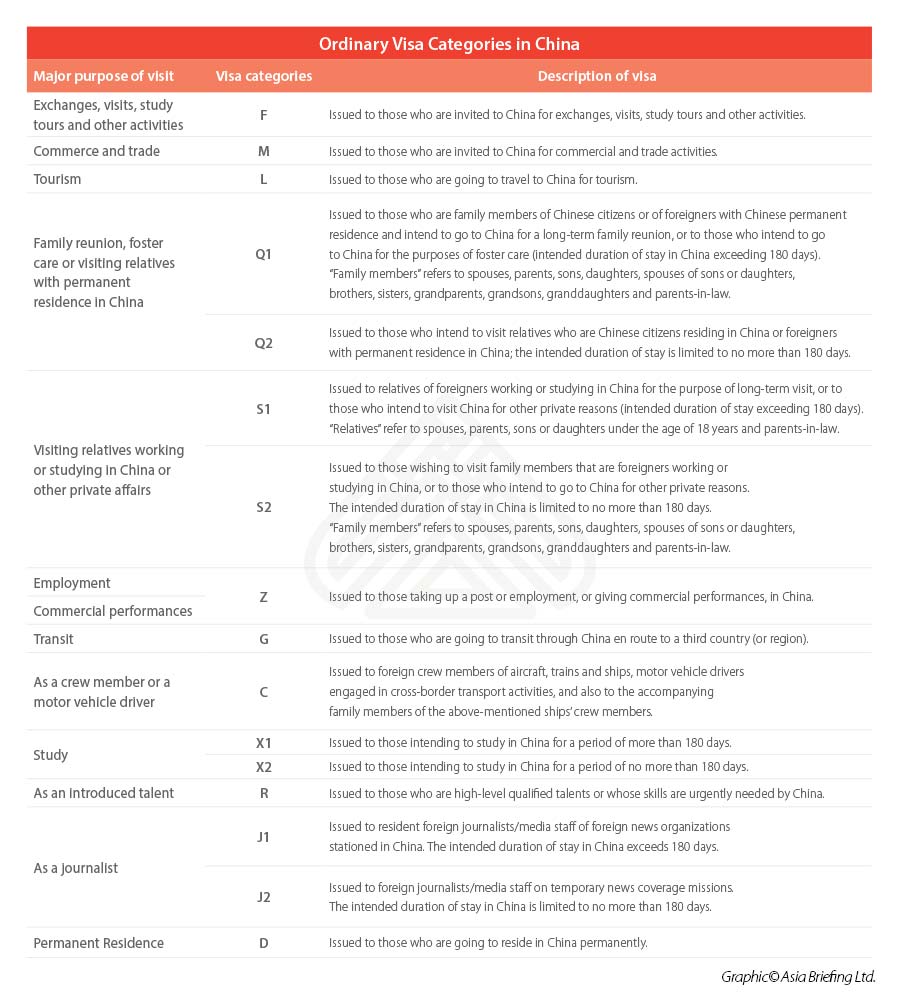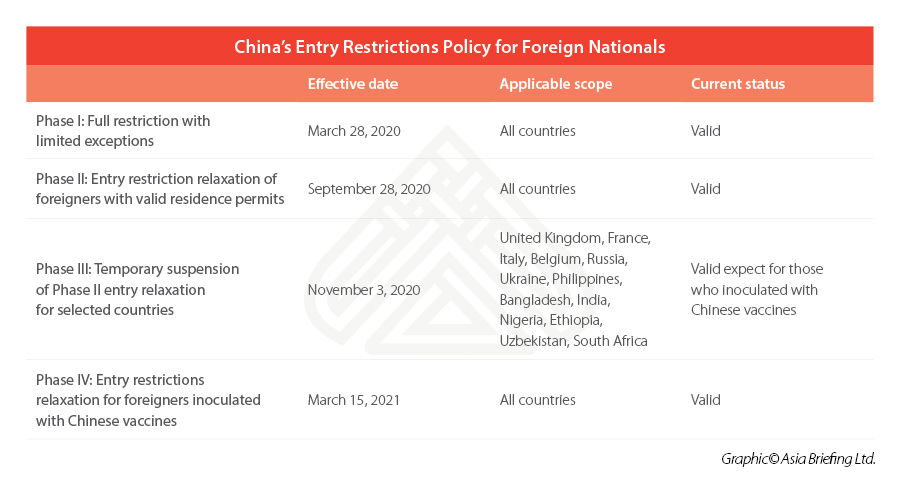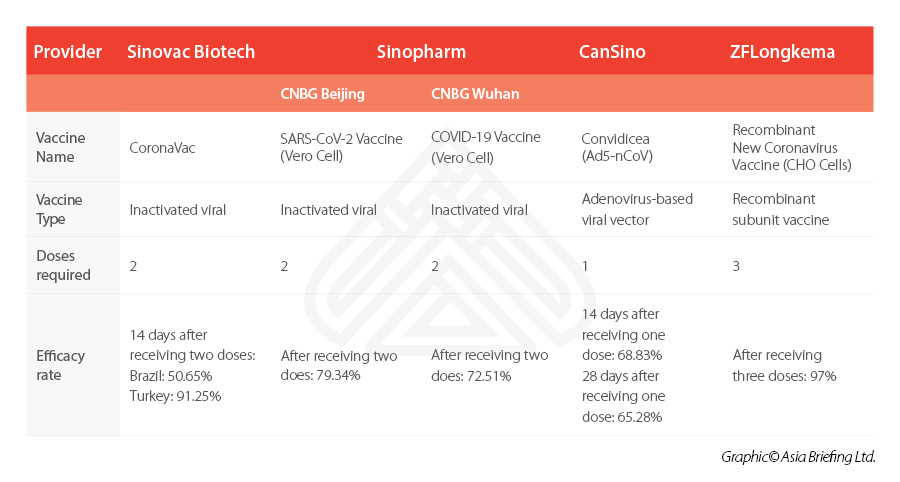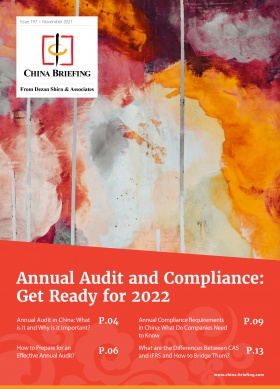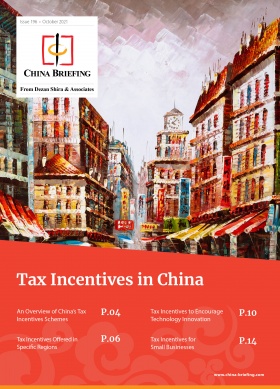How Can Foreigners Enter China Under the COVID-19 Travel Restrictions?
Written by Monica Li, Business Advisory, Dezan Shira & Associates’ Beijing Office
It has been more than a year since China closed its borders to foreign visitors on March 28, 2020. Since then, the detailed entry policies have been changed from time to time as the epidemic prevention and control status continues to vary both locally and abroad.
In such a scenario, it is necessary to keep track of the rules moderating how foreign visitors can enter China and under what circumstances.
This article tries to provide a thorough analysis of the travel restriction policies enacted in the past one year and offers a detailed entry guidance to the different categories of foreigners based on their visa type, inoculation status, nationality, and so on.
China’s visa system
Considering that the entry policies and relevant guidance may vary as per the visa status of the foreign visitors, we will first introduce China’s visa system.
Chinese visas are classified into four main types: diplomatic visa, courtesy visa, service visa, and ordinary visa.
The diplomatic visa and service visa shall be issued to foreigners entering China for diplomatic and official purposes. The courtesy visa is issued to foreigners with special status who are entitled to special privileges. And ordinary visas are issued to foreigners entering China for non-diplomatic and non-official purposes, such as work, study, relatives visiting, tour, business activities, and the introduction of talent for the corresponding category.
Accordingly, the ordinary visa is further divided into 12 sub-types with 16 categories. The details are shown in the table below:
Family members in the table refer to spouses, parents, sons, daughters, spouses of sons or daughters, brothers, sisters, grandparents, grandsons, granddaughters, and parents-in-law. D, Z, J1, Q1, S1, or X1 visa must be transferred into residence permit at local public security authorities within 30 days of entry into China. Once approved, the permit holder will be allowed to stay in China or enter/exit China multiple times for the duration of the validity of the permit.
A summary of the entry restriction/relaxation policies
China has been adjusting the entry policies from time to time based on the epidemic prevention and control situation, and so far, there are four major announcements that have been released and implemented.
Phase I: Full restriction with limited exceptions (since March 28, 2020)
On March 26, 2020, the Ministry of Foreign Affairs of the People’s Republic of China (MOFA) released the Announcement on the Temporary Suspension of Entry by Foreign Nationals Holding Valid Chinese Visas or Residence Permits, announcing that it will suspend the entry of most foreign nationals into the country from March 28, 2020.
Under the policy, from 0 a.m. March 28, 2020, foreigners who hold the following visas were not allowed to enter China:
- Ordinary visa (except for C visa) and its relevant residence permit;
- APEC Business Travel Cards; and/or
- Port visa
The ban also applied to those who planned to enter the country under the following policy:
- 24/72/144-hour visa-free transit policy;
- Hainan 30-day visa-free policy;
- 15-day visa-free policy specified for foreign cruise-group-tour through Shanghai Port;
- Guangdong 144-hour visa-free policy specified for foreign tour groups from Hong Kong or Macao SAR; and/or
- Guangxi 15-day visa-free policy specified for foreign tour groups of ASEAN countries.
Those who held diplomatic, service, courtesy, or C visas were not affected. Also, foreigners coming for necessary economic, trade, scientific or technological activities, or out of emergency humanitarian needs, were allowed to enter China by applying for the special visa with the invitation letter issued by the Foreign Affairs Office. The new visas issued after March 28, 2020 were not affected.
This policy applied to foreigners from all countries.
Phase II: Entry restriction relaxation of foreigners with valid residence permits (since September 28, 2020)
On September 23, 2020, the MOFA released the Announcement on Entry by Foreign Nationals Holding Valid Chinese Residence Permits of Three Categories, announcing that foreigners with valid residence permits for work, personal matters, and reunion, would be allowed to enter the country without needing to re-apply for new visas starting from 0 a.m., September 28, 2020.
Under the policy, if the above residence permits had expired – after March 28, 2020 – the holders could re-apply for relevant visas by presenting the expired residence permits and relevant materials to the Chinese embassies or consulates. But no invitation letter would be required. The re-application had to be on the condition that the purpose of the holders’ visit to China remained unchanged.
All other measures in Phase I continued to be implemented.
This policy applied to all countries.
Phase III: Temporary suspension of Phase II entry relaxation for selected countries (since November 3, 2020)
In early November, due to the explosive outbreak of COVID-19 in some countries, several Chinese embassies released the Notice on the Temporary Suspension of Entry into China by Non-Chinese Nationals in the (Country) Holding Valid Chinese Visas or Residence Permits, announcing that foreign nationals from these countries will not be able to enjoy the Phase II relaxation.
Under this policy, foreigners from these countries will need to fully follow the entry rules set during Phase I restrictions. The new visas issued after November 3, 2020 were not affected.
This policy applied to foreign nationals from the UK, France, Italy, Belgium, Russia, Ukraine, Philippines, Bangladesh, India, Nigeria, Ethiopia, Uzbekistan, and South Africa.
Phase IV: Entry restrictions relaxation for foreigners inoculated with Chinese vaccines (since March 15, 2021)
In early March 2021, several Chinese embassies released the Notice on Providing Facilitation for Visa Applicants Inoculated with COVID-19 Vaccines Produced in China, announcing that travelers who have received Chinese COVID-19 vaccines and obtained the vaccination certificate will enjoy facilitation for visa applications starting from March 15, 2021.
Under the policy, the following facilitation measures are provided:
- When applying for a visa, foreign nationals and their family members visiting mainland China for resuming work and production in various fields will only need to provide the documents required before the outbreak of the COVID-19 pandemic. The following documents are no longer required:
i) The invitation letter (PU);
ii) The invitation letter (TE); or
iii) The invitation verification notice issued by the foreign affairs offices or the departments of commerce of the provincial (including autonomous regions and municipalities) governments or the headquarters of central state-owned enterprises. - The scope of applicants eligible for applying for a visa out of emergency humanitarian needs will be expanded. Foreign family members of Chinese citizens or permanent residents of China, including spouse, parents, children, and other close relatives living together (referring to siblings, grandparents, and grandchildren), may submit visa applications for the purposes of reuniting with family, taking care of the elderly, visiting relatives, attending funerals, or visiting critically ill relatives.
- Holders of valid APEC business travel cards may apply for the M visa by presenting the original valid APEC business travel card and the invitation letter issued by the inviting party in mainland China.
- Restart Phase II relaxation policy, that is, unfreezing the Phase III suspension on valid residence permits (for work, personal affairs, reunion) holders from the UK, France, Italy, Belgium, Russia, Ukraine, Philippines, Bangladesh, India, Nigeria, Ethiopia, Uzbekistan, and South Africa to enter China.
To be noted, the above visa facilitation applies only to applicants who have been inoculated with COVID-19 vaccines produced in China, having either received two doses of Chinese-made vaccines with the stipulated gap in between, or received a single-dose Chinese-made vaccine at least 14 days prior to the application, and obtained the vaccination certificate. Also, the requirement that personnel intending to travel to China need to present double-negative certificates of nucleic acid and antibody (IgM) tests remains unchanged. The relevant Chinese quarantine policies shall be observed after entering China.
This policy applies to foreigners from all countries.
COVID vaccines in China
How can I enter China under COVID-19 travel restrictions?
Based on the above-mentioned policies, different foreigners may adopt different entry strategies based on their visa type/status, nationality, and vaccination status.
If you are a holder of diplomatic visa, service visa, courtesy visa, or C visa (under ordinary visa), you should follow the entry policies set before the travel ban, that is, the Phase I policy implemented since March 28, 2020.
If you are not a holder of the above visas, but have been inoculated with China-made COVID-19 vaccines properly (that is, either vaccinated two doses of Chinese-made vaccines with the stipulated gap in between or a single-dose Chinese-made vaccine at least 14 days prior to the application) and obtained the vaccination certificate, then:
- For necessary business activities, you and your family members can apply for corresponding visa by providing the documents as required before the outbreak of the COVID-19 pandemic. The invitation letter issued by relevant authorities is no longer required.
- Out of emergency humanitarian needs (for example, for the purpose of reuniting with family, taking care of the elderly, visiting relatives, attending funerals, or visiting critically ill relatives), foreign family members of Chinese citizens or permanent residents of China, including spouse, parents, children, and other close relatives living together (referring to siblings, grandparents, and grandchildren) can apply for corresponding visa for entering China.
- If you are holders of valid APEC business travel cards, you may apply for the M visa by presenting the original valid APEC business travel card and the invitation letter issued by the inviting party in mainland China.
If you are not a holder of diplomatic visa, service visa, courtesy visa, C visa (under ordinary visa) and you have not been inoculated with China-made vaccines properly, then the entry strategy will depend on your nationality:
- If you are from the countries that were subject to the policy under Phase III, including the United Kingdom, France, Italy, Belgium, Russia, Ukraine, the Philippines, Bangladesh, India, Nigeria, Ethiopia, Uzbekistan, and South Africa, you could try to apply for the special visa with invitation letter issued by relevant authorities in China – only out of emergency needs.
- If you are not from any of the selected countries, but you are holding a valid residence permit for work, personal affairs, and reunion, you can enter China with the residence permit.
- If you are not from any of the selected countries, and you are holding a residence permit for work, personal affairs, reunion, but your residence permit expired after March 28, 2020, you will need to apply for a new visa with the invalid residence permit. But you do not need to provide the invitation letter.
- If you are not from any of the selected countries, but you are also not a holder of the residence permit for work, personal affairs, and reunion, you may apply for the special visa with invitation letter issued by relevant authorities – providing that you are entering for necessary economic, trade, scientific or technological activities, or out of emergency humanitarian needs.
What can we do to help you come to China?
As a professional business service provider, we can provide you necessary support in understanding the most updated polices and status on a timely manner; should you have requests, please contact us without hesitation; you are welcome to email us at China@dezshira.com.
Disclaimer
The sources are from Chinese government authorities, but our inference or interpretations do not represent that of government authorities. If there is any inaccurate or misleading information here, please correct us. In addition, as repeatedly being stressed, as the policy changes from time to time, we will try our best to repost the relevant news in due course but please kindly note that the applicable range/rules for countries and/or applicants might be adjusted even as we update this article as the pandemic is in varying stages across the world.
About Us
China Briefing is written and produced by Dezan Shira & Associates. The practice assists foreign investors into China and has done so since 1992 through offices in Beijing, Tianjin, Dalian, Qingdao, Shanghai, Hangzhou, Ningbo, Suzhou, Guangzhou, Dongguan, Zhongshan, Shenzhen, and Hong Kong. Please contact the firm for assistance in China at china@dezshira.com.
Dezan Shira & Associates has offices in Vietnam, Indonesia, Singapore, United States, Germany, Italy, India, and Russia, in addition to our trade research facilities along the Belt & Road Initiative. We also have partner firms assisting foreign investors in The Philippines, Malaysia, Thailand, Bangladesh.
- Previous Article China and the RCEP: Guangzhou Becomes First City to Issue Special Cross-Border E-Commerce Measures
- Next Article China Lowers Corporate Income Tax Liability for Small and Low-Profit Enterprises


